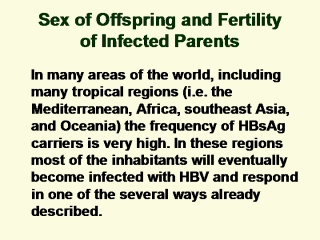 |
Our family studies
and the mother-child studies show that there is a maternal effect. Jana
Hesser (then a graduate student in Anthropology working in our laboratory)
and Ioanna Economidou, Stephanos Hadziyannis, and our other Greek colleagues
collected information on the sex of the offspring of parents in a Greek
province of Macedonia. In this community the probability of infection with
HBV is very high and a majority of the parents had evidence of infection,
i.e. detectable HBsAg and/or anti-HBs in their blood. It was found that if
either parent was a carrier of HBsAg there were significantly more
male offspring than in other matings (38). In subsequent studies using the
Greek data and additional data from Mali in West Africa, London, Drew, and
Veronique Barrois (a post-doctoral trainee from Paris) have found that there
is a deficiency of male offspring when parents have anti-HBs (39). This had
led London and his colleagues to test the hypothesis that anti-HBs has
specificities in common with H-Y or other antigens determined by genes on
the Y chromosome. If these observations are supported by additional studies,
then HBV may have a significant effect on the composition of populations in
places where it is common, which includes the most populous regions of the
world. The ratio of males and females in a population has a profound effect
on population size as well as on the sociology of the population. This
connection of HBV with sex selection may also explain why there is a greater
likelihood of rejection of male kidneys by renal patients with anti-HBs, and
indicate how kidneys can be better selected for transplantation.
Transplantation of organs and pregnancy have certain immunologic features in
common. Rejection of male kidneys and "rejection" of the male fetus may be
mediated by similar biological effects. |
